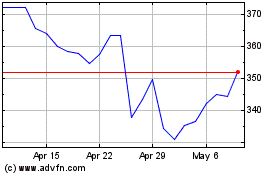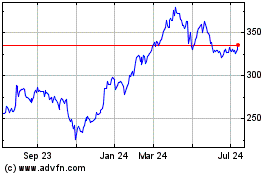President-elect Donald Trump threatened Thursday to punish U.S.
companies that shift jobs overseas as he praised a deal that would
save about 800 factory jobs in Indiana.
"Companies are not going to leave the U.S. anymore without
consequences," Mr. Trump said at a Carrier Corp. furnace plant in
Indianapolis. "Leaving the country is going to be very, very
difficult."
After receiving a phone call from Mr. Trump and a package of $7
million in state tax breaks, Carrier's parent, United Technologies
Corp., agreed to keep open the furnace factory it had planned to
move to Mexico and retain another 300 research and management
workers in the state.
Carrier had been a frequent target of Mr. Trump on the campaign
trail, where he promised to protect American jobs. He also during
the race castigated Mondelez International Inc. for moving some
Oreo cookie production to Mexico, and Apple Inc. for making many of
its devices abroad. Apple said it works with more than 8,000 U.S.
suppliers and is "investing heavily in American jobs and
innovation." Mondelez said it has had no contact with the Trump
transition team, and added that it does still make Oreos at other
sites in the U.S.
Mr. Trump used the Carrier announcement to repeat his criticism
of the North American Free Trade Agreement and his promise to
revise the agreement.
He offered a carrot-and-stick approach to enticing companies to
remain—a plan to lower the corporate tax rate to 15% from the
current 35%; a drastic cutback in regulations; and steep penalties
such as import tariffs for companies that move jobs out of the
U.S.
Like presidents including Ronald Reagan and Barack Obama before
him, Mr. Trump is trying to take credit for using the leverage of
the government to save industrial jobs. But Mr. Trump's gambit is
unusual, both for the way he zeroed in on a single company, and the
fact that the inducement will be provided by the state of Indiana,
before his term even begins.
What Mr. Trump described as his ability to bring outsourcing
corporations to heel has emerged as a compromise that will see a
break on corporate taxes in exchange for a commitment to keep some,
but not all, manufacturing jobs from leaving.
"CEOs are trying to figure it out," said Hal Sirkin, a senior
partner at Boston Consulting Group in Chicago, adding he had
discussed with half a dozen executives how Mr. Trump's
administration might affect their plans to move production outside
the U.S.
Many firms are likely to take their chances for the cost savings
of cheap labor and robust supply chains in Mexico, China and
elsewhere. Several companies—including at least three with plants
in Indiana—this year have announced plans to lay off workers or
phase out factories to move production abroad.
It is unlikely that these firms would change their plans,
according to Jeffrey Hammond, an industrial sector analyst for
KeyBanc Capital Markets. "The labor cost savings are significant
and the disincentive to not move would have to be pretty good," he
said.
Sen. Bernie Sanders said Mr. Trump "has signaled to every
corporation in America that they can threaten to offshore jobs in
exchange for business-friendly tax benefits and incentives."
Government and union officials say Carrier has previously said
it expected to save about $65 million a year by shifting the
Indianapolis plant's operations to Monterrey, in the state of Nuevo
Leon, where wages average about $11 a day. The average wage of the
Indiana jobs that will be retained is more than $30 an hour,
according to a document reviewed by the Journal.
Caterpillar Inc. is moving forward with a plan to cut 230 jobs
by 2018 at the Joliet, Ill., factory where workers make oil pumps
and valves, a spokeswoman said. Some of the plant's production has
been slated to move to Mexico.
Industrial conglomerate Rexnord Corp., commercial kitchen
equipment maker Manitowoc Foodservice Inc. and electronics
component maker CTS Corp. have announced plans this year to move
some operations abroad from Indiana. Rexnord intends to move
production of industrial bearings from Indianapolis to Monterrey.
The move, expected by the middle of next year, would eliminate
about 300 jobs in Indianapolis.
The United Steelworkers union, which represents hourly workers
at the plant, said Rexnord rejected the union's proposals for wage
freezes and other concessions to lower costs. The union said the
hourly wages at the plant, which currently range from $18.82 to
$30.81, would have to drop below the U.S. minimum to match the
company's estimated costs savings in Mexico. Rexnord didn't respond
to requests for comment.
Manitowoc is moving production from a plant in Clark County,
Ind., to Mexico. About 84 jobs will be eliminated by early next
year. Manitowoc, which split from its Wisconsin-based construction
crane parent early this year, is consolidating plants throughout
the world. The company declined to comment.
Mr. Obama has defended his administration's bailout of the auto
industry as a keystone of his economic legacy, and suggested it
preserved millions of jobs. Mr. Reagan slapped a tariff increase on
foreign-built motorcycles in 1983, aiding Harley-Davidson Motor
Co., then the only domestic motorcycle manufacturer.
As much as Mr. Trump celebrated Carrier's decision to keep jobs
in the U.S., the president-elect didn't back down from his tough
talk on the campaign trail over penalizing companies that move
offshore. He said Thursday he would seek to heavily tax companies
that fire U.S. workers, move production offshore and try to import
goods across the border.
Some economists called Mr. Trump's actions, including an earlier
agreement with Ford Motor Co. to keep some production at a Kentucky
plant, an unsustainable intervention in the economy.
"If this is what the Trump team thinks macroeconomic policy is,
then they don't understand the scale of the economy," said Justin
Wolfers, a professor of economics and public policy at the
University of Michigan.
The economy currently loses nearly 7 million jobs a quarter
through the churn of companies failing, closing or leaving the
U.S., Mr. Wolfers said, citing data from the Bureau of Labor
Statistics. "Firms contracting or leaving a market is the natural
state of business."
The more pressing issue for the incoming administration would be
to find ways to encourage more private job creation, rather than
trying to intervene to prevent individual firms from leaving or
shutting down. "Deal-making is not macroeconomic policy," Mr.
Wolfers said. "We should understand it's politics, not
economics."
"I want to tell all of the other companies—know that we are
going to do great things for businesses," he said. There is "no
reason for them to leave anymore."
While the incoming administration has stopped about 800 Carrier
jobs from moving to Mexico, it would have to stop 14,000 additional
jobs from leaving the country this year to reverse the effects of
Nafta.
A study published by the Peterson Institute for International
Economics estimated that imports from Mexico have displaced 203,000
jobs a year, but the two-way trade has also supported 188,000 jobs
due to U.S. exports headed to Mexico. That's a net 15,000 jobs lost
annually—a tiny fraction of U.S. employment, according to the 2014
study.
Some economists, pointing to the $61 billion U.S. trade deficit
with Mexico, say Nafta is responsible for a higher number of job
losses. But most agree that imports from China, where the trade
deficit measured $367 billion last year, are a bigger problem for
the U.S. economy.
"If this is a sign of enforcement of trade laws and wanting to
have domestic manufacturing, we welcome it," said Leo Gerard,
president of the United Steelworkers union, in an interview late
Wednesday. Mr. Gerard said the union kept the planned Carrier plant
closing "as a hot-potato political issue."
Democratic Sen. Joe Donnelly of Indiana said the company was
seeking cheaper labor—not relief from regulation—when it decided to
close the Carrier factory. Mr. Donnelly said he called Carrier
executives the day the closure was announced, after seeing press
reports that said the closure was driven by unhappiness over
government regulation.
"I had never gotten a call from anybody in the company about any
regulation problems or any issues they had regarding regulations,"
Mr. Donnelly said. "It was basically an excuse that was used. This
has been about chasing three-dollar-an-hour wages in Mexico from
the start."
Bob Tita, Andrew Tangel and Will Mauldin contributed to this
article.
Write to Ted Mann at ted.mann@wsj.com, Damian Paletta at
damian.paletta@wsj.com and Andrew Tangel at
Andrew.Tangel@wsj.com
(END) Dow Jones Newswires
December 02, 2016 01:55 ET (06:55 GMT)
Copyright (c) 2016 Dow Jones & Company, Inc.
Caterpillar (NYSE:CAT)
Historical Stock Chart
From Mar 2024 to Apr 2024

Caterpillar (NYSE:CAT)
Historical Stock Chart
From Apr 2023 to Apr 2024
